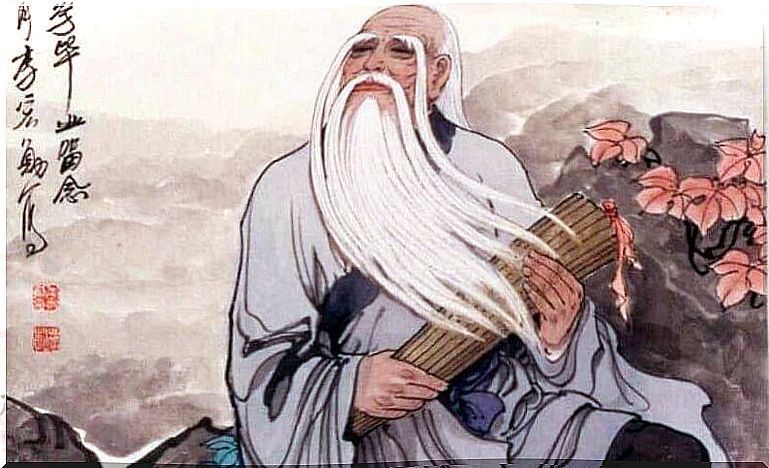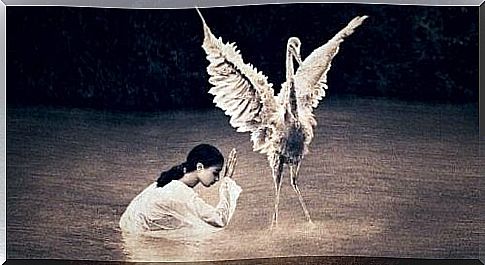5 Sentences By Laozi To Reflect

Laozi is a Chinese word that means “old teacher”. It is also the name of a philosopher and thinker who is presumed to have lived around the sixth century BC and to whom the writing of the Daodejing , the “Book of life and virtue” has been attributed . This figure, however, is still shrouded in mystery today, so much so that many doubt it really existed.
What is certain, however, is that his alleged intellectual legacy has managed to survive to this day. Whether it is the work of a single man or of several perhaps does not really matter. What matters is that she managed to shape teachings that are still handed down to us today, thousands of years later.
Laozi left us a huge legacy in terms of wisdom. His thinking reflects various essential principles of oriental culture. It is a hymn to prudence, simplicity and serenity. Enhance the values of intelligence and moderation. Today we want to offer you five of his wonderful aphorisms, which we hope will help you reflect.
1. Happiness in the eyes of Laozi
Laozi thought a lot about happiness. The idea of this oriental philosopher, many centuries before the advent of consumerism, was that it was necessary to free happiness from possessions. One of his immortal phrases, in which he addresses this topic, states: “ Whoever is not happy with little, will not be happy with much. “

This reflection invites us to place happiness within a framework in which it does not depend on what we have. In this way, having little is not synonymous with unhappiness. Just as having a lot is not the same as being happy. Well-being is achieved starting from a reality that has nothing to do with possessions. Happiness and unhappiness are within us, not in what surrounds us.
2. On stiffness and flexibility
Many people are convinced that firmness and verticality are great virtues. However, this perspective does not find a correspondence in the logic of life. Where there is life, there is change. And where there is change , there must necessarily be an adaptation. Life does not ask us to remain fixed like a steel stick, but to flow like a stream.
Laozi left us a splendid reflection on this point: “Man in life is soft and constantly evolving. When it dies, it becomes rigid and immutable. Plants in the sun are flexible and elastic. But when they die, they are dry and shriveled. This is why everything that is soft and flexible is associated with life, while what is immutable approaches death ”.
3. Love and be loved
Long before the emergence and spread of humanist doctrines, Laozi offered us a vision of love as energy. The philosopher underlines the difference between loving and being loved in one of his most famous aphorisms: “ Being loved deeply gives us strength; loving someone deeply gives us courage ”.

There is a subtle but fundamental difference between strength and courage. Strength can be defined as the physical or subjective ability to do something. Courage, on the other hand, refers to the decision and willingness to do so. Strength is being able to do. Courage, wanting to do. The emotional difference between the two concepts is immense. While the will leads to power, in fact, the opposite is not always the case.
4. Desire and frustration
Eastern culture is very careful about the rejection of desire. In fact it is considered the source of innumerable sufferings. Their philosophy is more oriented towards the ability to give up what you have, rather than the ability to seek what you want. True to this thought, Laozi reflected in this way:
“Those who do not want do not feel frustration. And those who don’t feel frustrated don’t get angry. Therefore, the true sage waits with serenity for everything to happen, without there being any desire. Only in this way can peace reign and the world can follow its natural course. “
In our Western culture this thought may seem almost absurd. We live in a society where ambition is seen as a source of growth and progress. And, however, the reality of our day has shown us that desire can also be a bottomless pit, which unfortunately never satisfies us.
5. To fight or to retreat?
The East is the cradle of martial arts. And yet, paradoxically, most of these arts have as their main principle the attempt to avoid combat. The greatest lesson of war, in fact, is the need to make an effort to avoid it. This is what the philosopher claims when he says: “ The strategist’s book says: Don’t provoke the fight, accept it. It is better to go back a meter than to go forward a centimeter “.

Laozi’s thought is certainly a great gift and a source of wisdom. It not only offers us a guide to learn the art of good living, but uses the language of poetry to impart its teachings. We certainly have a lot to learn from this mysterious millennial character, who today seems more alive and current than ever.









